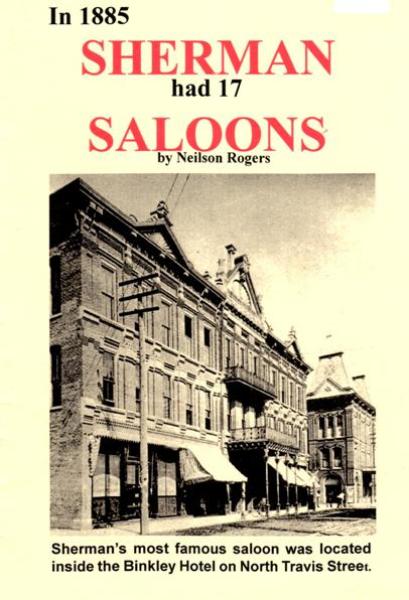  The
late Neilson Rogers, Sherman attorney for seven decades of legal and
judicial service in Grayson County, in retirement, he carried out
historical research and published books and articles on local history.
In 1885 there were 17 saloons in downtown Sherman with 11 of them on Travis St. Sam's Saloon was a one story wooden building owned by Mary Fitch, widow of a successful cattle drover. Mr. Fitch, owner of the Fitch Block, tore down the wooden building in 1886 and built a modern two-story brick building with latest gaslight chandeliers and furnishings. After construction of the new building, most of Sherman's prestigious saloons were on the west side of Travis St. The most famous was the Binkley Hotel Saloon, located just off the lobby at the southeast corner of the modern Binkley House. The Anchor Saloon, a wholesale liquor business that supplied the trade, was in a building adjacent to the Anchor Saloon. It made use of Sherman's first elevator, a dumb waiter contraption that moved alcoholic products to and from an upstairs storage location. Saloon business prospered in Sherman until the beginning of 20th century when, by majority vote, the area became dry. 1938, there were no saloons. However, several drug stores had doctors who, for a nominal fee, would write a prescription for a pint of whiskey for a person claiming to be sick, and the pharmacy would 'fll' the RX. Bootleggers would carry an empty suitcase to Dallas on the Interurban; purchase half-pints of whiskey to fill their suitcase, and return to Sherman and to sell their products. 1938 ~ Hall Sandwich Shop sold beer legally in Sherman. It was Sherman's last saloon. Its entrance was on Houston street with a swinging door that opened into a narrow building, approximately 15 feet wide. Near the west wall - a polished bar behind which bartenders worked. Beyond the bar, the building became much wider and contained tables with chairs where dominoes, etc were played. Here one could drink beer, eat the famous Hall's sandwich, play dominoes and discuss current events. Name-to-fame - in the trail of jury cases in the state courts of Grayson County. In 1938 the pre-civil war doctrine of white male supremacy still persisted in North Texas, only white men held elective offices and were officers of the court. There were no women lawyers, neither white women or blacks of either sex were permitted to serve on juries. Thus Grayson County was firmly segregated and the Hall Sandwich Shop was where white men gathered. During Great Depression, many were unemployed. conversations generally centered on local politics; when the courts were trying cases, the trials were closely followed. In Texas state court system, trial dockets were generally set for hearing on Monday mornings and an adequate number of jurors were subpoenaed. After excuses were granted, often there were not enough jurors so the court would instruct the Sheriff to go out in the town and gather jurors to complete the panel. The Sheriff would enter Hall Sandwich Shop and find many eager men to serve on a jury since one would get a dollar a day and get to enjoy the trial. This practice continued until well after World War II. During this time, at the noon recess the jury would usually march out of the courthouse and into the Hall Sandwich Shop for lunch, as well as the lawyers engaged in trials. Hall's survived into the age of television and sported an early TV set that attracted men who watched the fights and other sporting events. Its days were numbered for it could not compete with a trend toward private clubs and fancy restaurants. Saloon Advertisements Sherman History Susan Hawkins © 2024 If you find any links inoperable, please send me a message. |